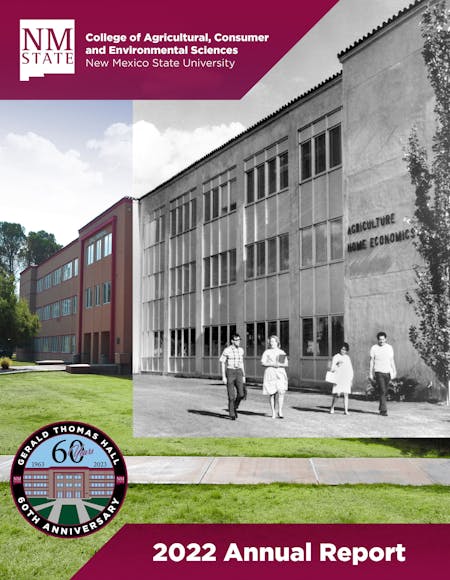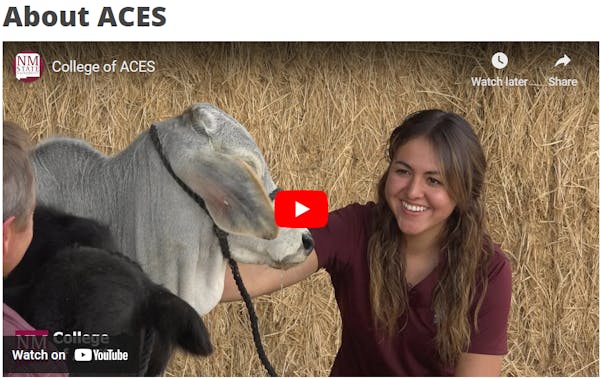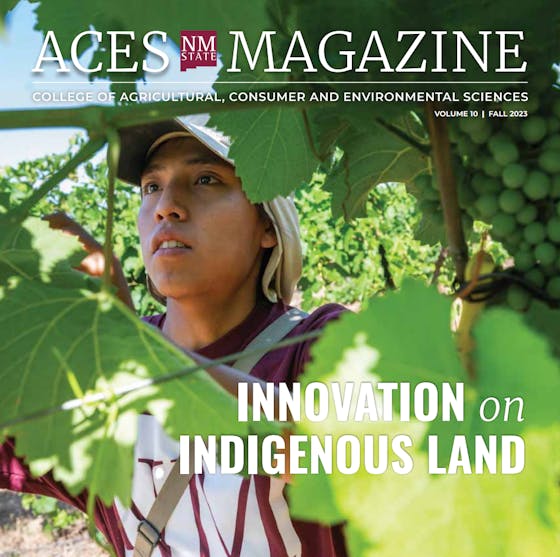VOLUME 2024, ISSUE #1 01/17/2024 |
A MESSAGE FROM OUR DEAN Greetings Aggies and Friends of the ACES College, Feliz Año Nuevo!! Looking at the fundamental challenges that we have at the college and NMSU, there are four major areas where we will continue to focus our activities in teaching, research, and extension. These four areas are water conservation and utilization, development of a value-added and sustainable agriculture, development of a digital agriculture that will benefit ranchers and farmers and New Mexicans in general, and increasing the delivery of online programs and training of the labor force in New Mexico. How are we following this plan? In terms of water conservation and management, we are starting the year with town hall meetings where scientists and others both inside and outside the community will participate and deliver their comments and suggestions for work to be done in the college. These town halls are critical for the work that the college will be doing in the future and how we are directed in achieving our goals. In terms of value-added and sustainable agriculture, we are extremely pleased with the new facilities that we have, consisting of the Food Science, Safety and Security Center and the Animal Nutrition and Feed Mill. In addition to these facilities, another element of our plan is the new faculty we have in place who are dedicated to these subject areas. These facilities contribute to and strengthen the Center of Excellence in Sustainable Food and Agricultural Systems (CESFAS) and support the case for approval of the new food science PhD programs at NMSU. These four elements are critical to establish a set of guidelines and areas of concentration as we look to develop a strong value-added component to a sustainable agriculture in New Mexico. The new finished products and by-products that will come out will not only benefit producers, ranchers, and farmers but also contribute to the importance of developing the labor force, conveying applied research, and moving the needle in areas that we traditionally have excelled in to support entrepreneurs in New Mexico and at the Arrowhead center. Also, in this area this is extremely important to generate a value-added supply chain to support success in this area. In terms of digital agriculture, we have faculty who are delivering outstanding work in the application of digital methods for cattle management, fencing, and drone technologies. Also, we have faculty working in collaboration with the College of Engineering developing robotics to ameliorate the labor shortage that we are experiencing in agriculture, as well as management of large databases generated with sensing equipment and other data gathering components, such as our Ziamet weather station network around the state. We also are looking towards the development of increased online learning from the College of ACES, critical to train the labor force in New Mexico as well as to create new markets for our traditional and new programs leading to bachelor’s degrees, master’s degrees, and PhDs. With the development of digital learning, there are no borders across which we cannot attract more students and, in some way, generate additional funding for the university and the state of New Mexico. These four areas of concentration in the current and near future are fundamental for the College of ACES and NMSU. Please join me in continuing to explore how our programs, activities, and impacts can support these goals. |
 |
U.S Representative Gabe Vasquez and U.S Deputy Secretary of Agriculture Xochitl Torres Small visiting the College of ACES on January 4, 2024. |
Rolando A. Flores Galarza Dean & Chief Administrative Officer |
NMSU SYSTEM ECONOMIC IMPACT STUDY |
|
|
The New Mexico State University system conducted an extensive economic development impact study to identify areas of economic success and determine any opportunities the university should pursue. The study was completed in the fall of 2023, and the following is an executive summary of the study's result. For a PDF copy of the complete report, click on the image at right. Executive Summary The Center for Border Economic Development and Arrowhead Center at New Mexico State University (NMSU) have prepared a study of the economic impact and contribution of NMSU for fiscal year 2022, from July 1st, 2021 to June 30th, 2022. Two approaches were used in this study: (1) Economic Impact Analysis, and (2) Industry Contribution Analysis. |
| |
|
The economic impacts of NMSU were estimated using IMPLAN economic modeling software2 and are based on economic activity occurring at the county level throughout the State of New Mexico. Spillover effects between counties in New Mexico were measured using Multi-Regional Input-Output (MRIO). Our economic impact and contribution analysis for NMSU in FY 2022 yielded the following results: - In FY 2022, NMSU had an economic impact in New Mexico of 3,671 direct jobs, 10,634 total jobs, $1.7 billion in economic output, $962 million in value-added production, and $587 million in labor income.
- In FY 2022, NMSU had an economic contribution in New Mexico of 11,463 direct jobs, 19,634 total jobs, $2.6 billion in economic output, $1.6 billion in value-added production, and $905 million in labor income.
- 4,777 degrees awarded by NMSU in FY 2022, worth a total estimated value of $1.2 billion in discounted future earnings.
To read the full study, visit https://nmsu.edu/economic-development/impact.html. |
NMSU RECOGNIZING UNSUNG HEROES |
New Mexico State University Provost Alan Shoho hosted a special celebration Thursday January 11, 2024 to honor the university’s unsung heroes. Seventy-one NMSU faculty and staff members were recognized at the luncheon. “NMSU has so many unsung heroes,” Shoho said. “They do a great job without formal recognition. The unsung heroes luncheon is one small way to honor their dedication and commitment to NMSU. I am proud to recognize each and every one of them.” The honorees were selected based on nominations from colleagues and supervisors. Shoho recognizes nominees in his weekly Alan’s Monday Message emails to the campus community. |
Unsung Heroes from the College of ACES in the company of Provost Alan Shoho and Dean, Chief & Administrative Officer Rolando A. Flores Galarza |
ACES hosted visitors from Universidad Autónoma de Chihuaha, Ciudad Juárez (UACJ) On September 15, 2023, Dr. Soum Sanogo gave a presentation in the seminar series of the Departamento de Ciencias Químico Biológica, Universidad Autónoma de Chihuaha, Ciudad Juárez (UACJ), on using agricultural probiotics for managing soilborne diseases. After the seminar presentation, an interest developed in establishing collaborative research on the utilization of plant-based compounds as elicitors of induced resistance in plants against plant pathogens. On December 12, four faculty of UACJ (Dr. Joaquin Rodrigo Garcia, Dra. Laura Alejandra De la Rosa Carrillo, Dr. Emilio Alvarez Parrilla, and Dra Perla Aracely Magallanes Cruz) visited with several faculty members of NMSU-ACES to initiate discussions on collaborative research. ACES Faculty participating in the visit/discussion were Dr. Ivette Guzman, Plant and Environmental Sciences (PES), Dr. Phillip Lujan, Department of Extension Plant Science (EPS), Dr. John Campbell, ACES International Program Coordinator, Dr. Ricardo Ramirez, Department Head of Entomology, Plant Pathology, and Weed Science (EPPWS), Dr. Efran Delgado, Department Head of Family and Consumer Science (FCS), Dr. Victor Velazquez (FCS), and Dr. Soum Sanogo (EPPWS and visit coordinator), and several staff and students of EPS and EPPWS, and ACES Dean’s Office. The UACJ were given a tour of research and teaching facilities in Skeen Hall, and in the new building for Food Science, Security and Safety Center. Heber Lara and Erika De La O Medina from ACES Dean’s Office provided information on establishing a relation between UACJ and ACES. For more information contact Dr. Soum Sanogo at ssanogo@nmsu.edu. |
 |
AGRICULTURAL EXPERIMENT STATION |
|
|
| The Interregional Research Project # 4 (IR-4) was established in 1963 as an open collaboration between government agencies, specialty crop producers, and agrochemical industry partners. The objective of this collaboration is to register pest management solutions for specialty crop producers; an endeavor that is normally not profitable for agrichemical companies to pursue alone with the Environmental Protection Agency (EPA). In New Mexico, IR-4 is active in two program areas. The Environmental Horticulture Program focuses on nursery and landscaping pest management needs, and the most active Food Use Program focuses on pest management needs in specialty crops (i.e. chile, onions, pecans, peanuts, etc.) grown for food consumption, collectively representing the most valuable sector in New Mexico farming (» $558.6 million, New Mexico Agricultural Statistics 2021 Annual Bulletin, NMDA). The ACES College at New Mexico State University offers an ideal framework to make the NMSU IR-4 Program successful through cooperation between the Agricultural Experiment Stations and the Cooperative Extension Service. https://ir4.nmsu.edu |
|
|
National Climate Change Roadmap The roadmap was released at the Association of Public Land Grant Universities Annual Meeting on November 13, 2023. It identifies national priorities for U.S. climate change research related to working lands over the next decade. With a grant from the U.S. Department of Agriculture National Institute of Food and Agriculture (USDA NIFA), a Colorado State University (CSU) research team developed the Roadmap with support from Meridian Institute and 61 leading scientists. CSU and Meridian implemented a Horizon Scan methodology—a visioning process that synthesizes trends and knowledge gaps related to agricultural research and climate change—to project key focus areas for research, extension, and education. The horizon scan engaged 61 leading scientists from 51 institutions across the U.S. who contributed expertise in a wide range of disciplines and a broad diversity of perspectives to inform the Roadmap. Guiding research principles and cross-cutting themes emerged, culminating in a framework for science and funding that is systems-based and highly participatory. The framework presented is not an endpoint but rather a starting place from which to evolve and refine to meet climate science challenges for the benefit of agriculture, working landscapes, and the communities that rely upon them. You can find more about the process, principles, and themes from the National Climate Change Roadmap here. |
 |
AGRICULTURAL ECONOMICS & AGRICULTURAL BUSINESS |
Climate Change Research Recent research led by an ACES faculty finds that crop insurance influences the impacts of climate change on crop yields. Climate change poses a significant threat to agricultural productivity. A recent study led by ACES faculty Dr. Madhav Regmi and his colleagues from Kansas State University examined whether the U.S. Federal Crop Insurance Program (FCIP) influences crop yield impacts under climate change. The study combines farm-level data for Kansas corn and wheat producers spanning 643 farms and 22 years with historical weather data to estimate the effect of warming temperatures on yields in the presence of crop insurance. The study finds larger dryland corn yield reductions from warming in insured producers compared to uninsured ones. Further, the research finds that “+1°C warming scenario leads to yield reductions of 16.7% (11.8%) for insured (uninsured) corn production; and 6.0% (4.4%) for insured (uninsured) wheat production”. These findings may imply that FCIP, a farm income support program (with a total projected outlay of about $101 Billion over the next 10 fiscal years - from FY 2024-FY 2033), may influence farm-level adaptation decisions to mitigate climate change impact. Nevertheless, the research provides empirical evidence indicating that the adverse effects of crop insurance on non-irrigated crop yields under climate change vary based on crop type, drought severity, and growing seasons. The article was published last month in December 2023. It’s open access and can be accessed at: https://onlinelibrary.wiley.com/doi/full/10.1002/jaa2.92 For more information, contact Dr. Madhav Regmi at mregmi@nmsu.edu. |
 |
Figures show the nonlinear relation between positive temperature and crop (corn and wheat) yield. Figures (a) and (b) are constructed using the coefficient estimates of heat variables, respectively for corn and wheat. Each of these graphs represent the change in the log yield if the crop is exposed for 1 day to a specific 1°C temperature interval. 95% confidence bands are shown using standard errors. |
ENTOMOLOGY, PLANT PATHOLOGY & WEED SCIENCE |
NMSU Innovation for Detection of Agricultural Contaminants Dr. Jennifer Randall, professor in the Department of Entomology, Plant Pathology, & Weed Science, and director of the Molecular Biology and Interdisciplinary Life Sciences Graduate Program, worked with Drs. Gary Eiceman (NMSU), Gyoungil Lee (NMSU), and Alexandre Tarassov (Seven Fields, PA) to develop an agricultural contamination detection apparatus. One such contaminant is aflatoxin that is produced from fungi Aspergillus spp. and can lead to health effects when consumed if they enter the food supply. Contaminants in processed foods are federally regulated but for some products like pistachio nuts, traditional methods for detection of aflatoxins are not effective. Since 2016, Dr. Randall and her team have worked to invent a solution to this problem that is now patented. The invention will allow producers to screen their crops continuously and non-destructively. Her work was recently featured in a variety of venues highlighting NMSU’s women inventors. https://newsroom.nmsu.edu/news/nmsu-researchers-receive-patents--hope-to-inspire/s/01bbd4c7-fa22-4e2a-b24c-cc78471955aa https://panorama.nmsu.edu/news-events/2023/fall/features/influential-innovators.html For more information, contact Dr. Jennifer Randall at jrandall@nmsu.edu |
 |
Jennifer Randall is an NMSU entomology, plant pathology and weed sciences professor and director of the Molecular Biology and Interdisciplinary Life Sciences Graduate Program. |
FISH, WILDLIFE, & CONSERVATION ECOLOGY |
|
|
| The Fish, Wildlife, and Conservation Ecology Department welcomes Dr. Obed Hernández-Gómez as a new assistant professor of Wildlife Disease Ecology. Dr. Hernández-Gómez is originally from El Paso, did his undergraduate and doctoral work at Texas Tech and Purdue Universities, and then completed a NSF Postdoctoral Fellowship at the University of California, Berkeley. Dr. Hernández-Gómez arrives at NMSU with experience teaching disease ecology, herpetology, genetics, and microbiology at a small liberal arts college in California. |
|
|
Recent work in his lab documented how the 2020 Northern California wildfires influenced the population health, fungal disease prevalence, and microbiomes of terrestrial wildlife, and the use of immunogenetics and environmental DNA to inform conservation decisions in reptiles and amphibians. The lab welcomes undergraduate and graduate students interested in developing expertise in modern molecular techniques while studying pressing issues related to the disease ecology of New Mexico’s wildlife. Dr. Hernández-Gómez has a strong record of mentoring undergraduates, and he will be teaching courses in Disease Ecology and Herpetology Dr. Hernández-Gómez looks forward to establishing K-12 outreach programs in the region where he grew up. To learn more about the work being conducted in the OHG Lab visit: www.obedhg.com |
INNOVATIVE MEDIA RESEARCH & EXTENSION |
Phytophthora Videos and Animations for National Soilborne Disease Research Project New multimedia sheds light on our college’s efforts to combat Phytophthora blight, a soilborne disease of chile and other vegetable crops. These materials, at phytophthora.nmsu.edu, explore farmers’ experiences with Phytophthora in the Mesilla Valley, ongoing work in the Soilborne Disease Research Laboratory at the College of ACES, additional research at NMSU, and a simulated animation of the life cycle of Phytophthora blight. Vince Hernandez, agronomist for a local chile company in the Mesilla Valley, expresses the negative impact this plant disease can have on producers: “Phytophthora is very important economically, if you lose your plants to Phytophthora it is totally useless for processing. A farmer can lose anywhere from a small percentage, to 50% or more of a chile field…” Dr. Soum Sanogo, professor of fungal plant pathology at the College of Agricultural, Consumer, and Environmental Sciences (ACES) at New Mexico State University (NMSU) leads the project. Scientists are investigating various risk factors, such as soil health, moisture levels, host resistance and fungicide resistance to determine effective ways to keep crops safe from the harmful pathogen. Dr. Ram Acharya of our Department of Agricultural Economics and Agricultural Business will study the research data shared with chile producers and explore how having access to this information affected their operations and how this impacted the economy of chile in our region. The videos produced for this project can be viewed at Phytophthora.nmsu.edu or directly at YouTube: Vegetable Phytophthora Blight - A Scare to Vegetable Growers https://youtu.be/MuYOB_x0Mks Soilborne Disease Research Laboratory at NMSU's College of ACES https://youtu.be/a-j5dxQBspg Phytophthora: A Life Cycle
https://www.youtube.com/watch?v=2ovYY7BuBHw |
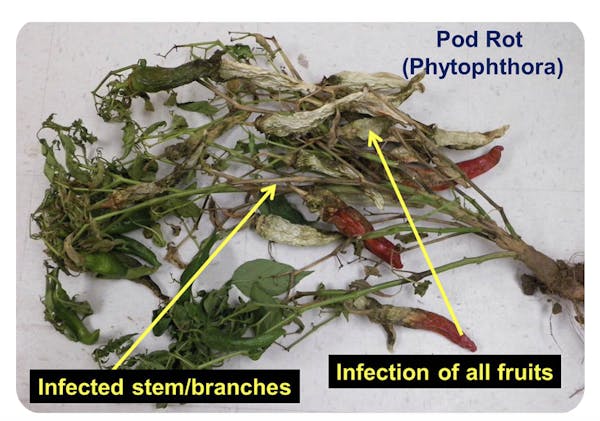 |
|
|
NEW MEXICO FFA ASSOCIATION |
Spring for NMFFA New Mexico FFA hopes everyone had a very restful and Happy Holidays and New Year! NMFFA is gearing up for a very busy spring! There are many upcoming events, the first being the New Mexico State Parliamentary Procedure Contest held at Eastern New Mexico University in Portales. Following this will be the FFA Day in Santa Fe. Members get an inside look at the government in New Mexico as well as a chance to speak with our legislators and elected officials. The last event before the busy season of Career Development Events is the New Mexico Leadership Conference held in Albuquerque. NMFFA is beyond excited about all of these awesome opportunities that we have in the upcoming months! |
|
|
For more information about NMFFA and future events, visit our website and social media pages. Website: http://www.nmffa.org Facebook: New Mexico FFA Instagram: @newmexicoffa |
|
|
SCHOOL OF HOTEL, RESTAURANT & TOURISM MANAGEMENT |
The Greater Albuquerque Hotel and Lodging Association (GAHLA) consists of local lodging and associated businesses committed to providing an educational and leadership forum for the exchange of information on the hospitality industry and other community related issues. 2023 Scholarship Award Winners Every year, GAHLA raises money for our scholarship fund, offered to college students pursuing degrees in Hospitality and Tourism or Culinary Arts. This year, our Association recognizes the following students: |
|
|
Jonathan Uvalle - Full time student at NMSU, dual degree in HRTM & IT
- Expected graduation is May, 2027
- Grandmother was a housekeeper for many years, love of hotels from her (3rd generation)
- Very active with NMSU’s E Sports & the ICT department
- Goal is to use his IT studies to help solve issues in hospitality
Jonathan Venegas - Full time student at NMSU
- Expected graduation is Dec, 2024
- President of National Society of Minorities in Hospitality
- Started college as a Mechanical Engineering major; discovered hospitality and switched majors
- Would like to work in hotel sales or venue management after graduation
|
| Alejandro Esparza (2nd year for scholarship) - Full-time student at NMSU
- Expected graduation in December, 2024
- Member of National Society of Minorities in Hospitality
- Started working as a bus boy at 14 and fell in love with hospitality
- Would like to manage a restaurant or resort after graduation, possibly open his own in the future
Grace Sarfo (*Larry Atchison scholarship) - Full time graduate student at NMSU
- Expected graduation is May, 2024
- From Ghana, has a BS in Hospitality Management from University of Cape Coast
|
|
|
Makayla Montoya (2nd year for scholarship) - Full-time student at NMSU
- Expected graduation is May, 2024
- Vice President of National Society of Minorities in Hospitality
- Has been in the industry since she was 15, when she worked as a buser in Taos
- Plans to continue her work in F&B for a large hotel or resort
|
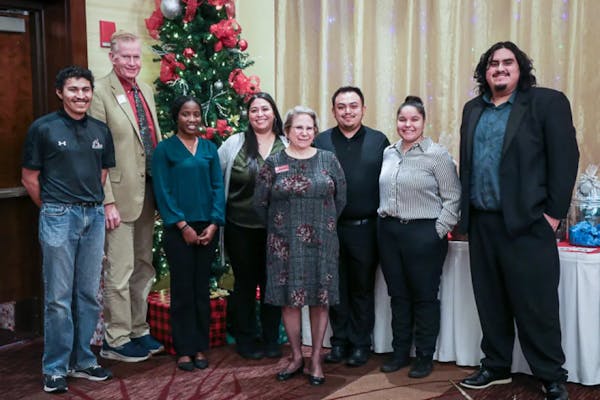 |
Annual Hospitality and ACES Career Fair The School of Hotel, Restaurant and Tourism Management, along with the College of ACES, invite you to participate in our Annual Hospitality and ACES Career Fair on Thursday, February 22, 2024 at the Las Cruces Convention Center. Prior to the event through the Marriott Hospitality Futures Center and the College of ACES, we will be conducting professional development workshops to benefit participants. There is also a Welcome Reception for students to network with employers the evening before. The Career Fair is from 9:00am–12:00pm for students to learn more about the companies and potential career, internship, and part time employment. Some companies will be offering same-day interviews scheduled that afternoon. Attendees must sign up for interview times during the fair. This event is open to all majors and has been expanded to highlight all disciplines of the College of ACES as well as overlapping areas of interest such as the College of Business, DACC and EPCC Culinary and Hospitality programs. We encourage all majors to promote student attendance, connect us with related employers, and support professional development resources such as the Career Closet. For more information, please contact Andrea Arrigucci at arrigucc@nmsu.edu. |
 |
Over the years, winter temperatures have been rising significantly in the western United States, resulting in earlier snowmelt and runoff seasons. Being able to properly monitor climate change impacts on river basins, streamflow, and snowmelt in real-time has been an increasing concern due to standardized assessment methods being currently unavailable. To improve data-monitoring policies, adopting the concept of adaptive capacity could allow for more flexible and equitable water allocation, by enabling the testing and learning of new management strategies. Researchers from New Mexico State University and Oregon State University chose to further explore this idea by providing a rural agricultural community with a monitoring tool to assist in meeting local water management demands. They hypothesized that this would improve their adaptive capacity and better prepare them for threats of long-term drought. The Rio Hondo watershed was chosen as the representative study site due to community participation and established interconnected networks. This project developed an acequia streamflow data monitoring system with telemetry capabilities. The system had the capability to transmit data on water level, temperature, and electrical conductivity through a web interface. The data was sent remotely every 15 minutes, and users had the option to receive automated emails containing all the collected data. By gathering survey responses, hosting meetings, and engaging in informal conversations, the researchers were able to tailor the design of data collection to meet the specific needs of the community. They improved graphical displays to enable better visualization of trends over time, and provided Acequia leaders and water managers with more accurate real-time monitoring. As a result, data became more accessible, and the indicators of adaptive capacity, such as information diversity, cognitive social capital, leadership, and proactivity, were enhanced. This study, "Real-time irrigation diversion data delivery can benefit adaptive capacity in communal irrigation systems," can be accessed in the Journal of the American Water Resources Association by clicking here. For more information, contact Dr. Alexander Fernald at afernald@nmsu.edu. |
 |
Overview maps of the study area showing (a) land use (Sabie et al., 2018) within the Rio Hondo area of interest, Acequia reaches, telemetry site locations, United States Geological Survey (USGS) stream gauging station and (b) monitoring site locations with respect to the entire Rio Hondo watershed in northern New Mexico (inset). |
Spring 2024: AI4ALL Ignite Accelerator What is AI4ALL Ignite? - AI4ALL Ignite is a no-cost virtual accelerator that provides undergraduate students the opportunity to work on an AI portfolio project with mentorship and guidance from AI industry experts, a student symposium to showcase their work, and extensive and practical training in career readiness and & the technical AI internship interview. Two accelerators are on the horizon for 2024 – one cohort starting in late January 2024 and one cohort starting in September 2024.
- The program runs in Spring 2024 and Fall 2024. This application is specifically for the Spring 2024 cohort. You may find a student interest sheet for the Fall 2024 cohort on the AI4ALL Ignite website.
What is the cost of participating in the accelerator? - There is no cost to participate in AI4ALL Ignite.
Why should you apply? - Receive an AI4ALL Certificate of Completion
- Develop technical skills by building an AI and Machine Learning portfolio project with other students from across the U.S. and an AI industry mentor
- Present AI/ML portfolio project at a one-day networking virtual symposium
- Work with an AI Career Readiness Instructor to optimize your job search and documents
- Master the AI technical interview by participating in mock interviews with AI industry professionals
- Participate in opportunity chats with AI industry recruiters
- Become life-long AI4ALL alumni and given access to opportunities that allow them to participate in networking programming, career support initiatives, and other relevant career-readiness resources
What will you learn? To learn more about Ignite's curriculum and outcomes, please visit our website. What is the timeline for admissions and the Spring 2024 accelerator? AI4ALL Ignite – Spring 2024 Timeline - December 15, 2023: Early Application Deadline
- January 22, 2024: Final Application Deadline
- Week of January 29, 2024: AI/ML Portfolio Project Component Synchronous Launch
- Weekly Synchronous Sessions Begin
- April 2024: One Day Virtual and Synchronous Symposium
- April 2024 to July 2024: Summer Break
- July 2024 to September 2024: AI Career Readiness
We highly recommend applying early as space is limited, and the application may close early. The Fall 2024 cohort application opens in February or March 2024. To be notified for Fall 2024, please submit the student interest form found on our website. REQUIREMENTS- 18+ years old
- Undergraduate student enrolled in a U.S. college/university pursuing a major/minor related to Computer Science (e.g. Computer Science, Data Science, Electrical Engineering, Mathematics),
- Basic programming in Python (e.g. CS1,) & will welcome students that work with languages other than Python*
- Probability and Statistics, & Linear Algebra
|
Click on the following link to give to the College of ACES. Give Now | New Mexico State University Foundation (nmsu.edu) You can also contact Planning Officer, Erika De La O. Medina at erikadlo@nmsu.edu for more information on how to give to the College of ACES. |
The College of Agricultural, Consumer, and Environmental Sciences (ACES) annual report provides an overview of accomplishments during 2022, including impacts, productivity
and goals for each unit, area and program. These accomplishments reflect our work in
teaching, research and extension. To view our College of ACES 2022 Annual Report click on the following link: Annual Reports | New Mexico State University - BE BOLD. Shape the Future. (nmsu.edu) |
Our department of Innovative Media Research & Extension produced a great video demonstrating our college. You can access the video by clicking on the following link: ACES About Home (nmsu.edu) |
COLLEGE OF ACES MAGAZINE – FALL 2023 ISSUE |
|
|
The College of Agriculture, Consumer and Environmental Sciences is an engine for economic and community development in New Mexico, improving the lives of New Mexicans through academic, research, and Extension programs. |
|
|
| |



















